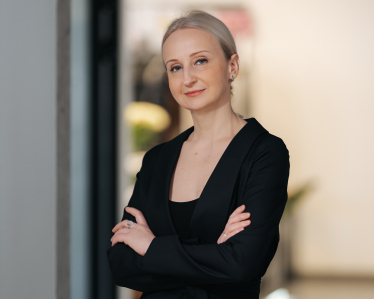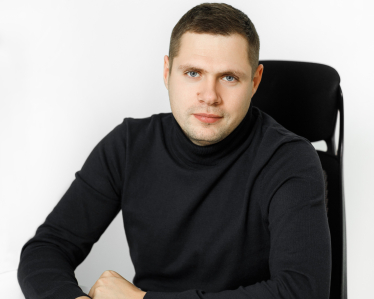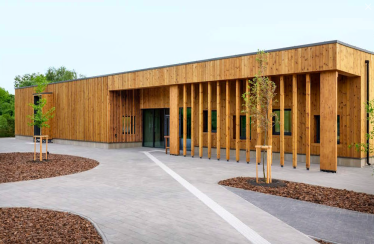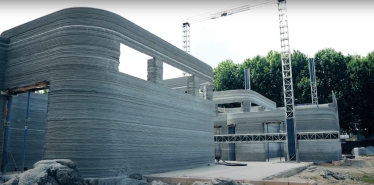Experts from 7CI Group on How the Ukrainian Construction Market Can Prepare for Recovery
Devastated cities, industrial facilities, and critical infrastructure are in dire need of restoration – some requiring immediate attention, while others will need to be addressed after the war concludes. Experience shows that many recovery projects rely on financial support from international donors. However, a pressing question arises: Is the Ukrainian construction market prepared for the massive challenges of today and the future? Will there be enough skilled construction firms, production companies, design offices, and suppliers of materials and equipment to execute these projects?
Throughout the war, international organizations such as USAID, GIZ, the Red Cross, NEFCO, UNDP, and the International Organization for Migration have been active in Ukraine, implementing critically important recovery initiatives. These projects demand adherence to international standards and financial transparency from local partners. Yet, only a tiny fraction of Ukrainian companies are equipped to meet these requirements, as noted by 7CI Group. At the same time, foreign contracting firms with experience in similar projects show interest in the Ukrainian market and could pose serious competition to local businesses.
What steps should Ukrainian companies take now to become competitive players in the construction market under these new conditions? This insight comes from Natalia Deren, founder of 7CI Group, Sergey Chukhrai, construction director at 7CI Group, and managing partner Olga Havura. For further details, read the explainer in Forbes BrandVoice.
Natalia Deren
founder of the construction project company 7CI Group
Back in 2013, we made a strategic decision to develop the company into one of the leading general contractors in the Ukrainian market, capable of executing construction projects for foreign clients.
Based on our 11 years of experience participating in tenders that meet the qualifications of international contractors, as well as our success in winning such tenders and successfully delivering numerous construction projects to foreign standards as a general contractor, we have identified eight criteria that Ukrainian construction companies must meet today:
1. Strong Competence in Project Management Among Contractor Teams is Essential
A key requirement in tenders is the composition and expertise of the project management team from the general contractor. To meet the qualification criteria of the tender, participants must submit their organizational structure, project team details, and resumes for each member planned to be involved in the execution. Clients want to be assured that the general contractorʼs team can meet the fundamental requirements for successfully implementing the project – adhering to timelines, staying within budget, and delivering quality work under approved project designs.
To ensure compliance with these requirements, we form our project management teams within the structure of our company. We train our specialists in the best project management methodologies, tools, and practices, both in business schools and internally.
Project management teams must possess strong technical skills as well as well-developed soft skills to navigate the complexities of their roles effectively.
2. Reliability in Contract Compliance
Reliability in contractual terms is the second crucial criterion for selecting a tender winner. For foreign clients, it is essential to ensure that the project will be executed precisely as agreed: within the established timelines, at the specified contractual price, and to the appropriate quality and technical standards. Its portfolio and customer feedback guarantee the companyʼs reliability. Foreign partners carefully check the accuracy of the information in the portfolio, visit completed projects, and communicate with previous and current customers of the general contractor. This selection stage often occurs even before an invitation to tender is issued.
This is how the tender for constructing the UNBROKEN Prosthetics and Orthotics Center, utilizing innovative CLT panel technology, was conducted. It was the largest project in Ukraine within the portfolio of the German GIZ Foundation, as well as the most significant CLT panel project to date. The project manager from the foundation traveled to Ukraine specifically to select general contractors. He also visited our most significant projects implemented by 7CI Group, including the Jam Factory Art Center in Lviv, a contemporary art cultural center commissioned in 2023. We successfully navigated the selection process, won the tender, and completed the construction of the Center for Prosthetics and Orthotics in Lviv in record time during the winter, fully adhering to the agreed contractual price.
Jam Factory Art Center, a cultural center for contemporary art, is a project implemented by 7СІ Group
Upholding our commitments and business obligations forms the cornerstone of our companyʼs cultural code. This approach has been instrumental in building a long-term reputation as a reliable general contractor.
3. Financial Stability and Transparency
Nowadays, a companyʼs financial statements are becoming increasingly important for foreign customers, as they serve as the primary criterion for assessing a potential contractorʼs financial stability and transparency. For instance, to participate in NEFCO tenders, it is required that the average annual construction turnover has been at least EUR 1,680,000 over the past three years. Other funding entities also focus on the companyʼs profitability, as reflected in its financial statements, and overall stability, which means consistent growth in profitability over several years. A common requirement is that foreign partners provide a bank guarantee for the advance payment amount from a list of accredited banks. Receiving an advance payment is a mandatory condition of the tender, ensuring the contractor has sufficient funds to implement the project promptly and without delays.
Foreign companies also require a sufficient level of average wages and the absence of tax arrears from the tenderer. This necessitates transparent contracts, non-cash payments, financial transparency, and strong financial literacy among Ukrainian companies. While this entails additional costs for businesses, it invests in sustainability and long-term success.
Increasing financial stability year after year is one of the key priorities for a general contractor striving to implement large-scale and innovative construction projects. At Seven C.I., we integrate this principle into our development strategy and ensure that the following factors are considered for our annual budgeting.
The following important criteria that Ukrainian construction companies must meet today are:
4. Technical expertise in both construction and the development of design solutions
5. A culture of safety in production
6. The availability of production facilities and specialized personnel on staff or a well-developed network of partner contractors
Sergiy Chukhrai
Construction Director, 7CI Group
Historically, our companyʼs top managers, foremen, and craftsmen have paid great attention to detail. We strive to get to the root of the issue to understand why a particular solution, material, or technology is necessary for addressing specific challenges.
To maintain and enhance technical expertise within the company, we have established an R&D team. This team consists of specialists whose primary function is to study new technologies in construction and design, implement them, and train our staff to execute these technological solutions at a high level of quality.
Sharing experiences among different project teams is crucial; therefore, we maintain a Lessons Learned database utilizing Microsoft SharePoint to document our mistakes, solutions, improvements, and successful experiences. Our project and site managers receive training at the PRO PM Construction Project Management School.
We also emphasize the younger generation and are committed to actively training young men and women in essential trades. To facilitate this, we have created a lyceum within the 7CI Group and are currently developing a training program for installers of metal and wooden structures. Furthermore, we plan to expand our training programs in the future.
Everyone knows that construction is one of the most injury-prone industries. Therefore, our top priority is adherence to health, safety, and fire safety regulations.
While not all construction companies allocate funds for occupational health and safety measures, this criterion is undoubtedly critical for foreign clients. If you aim to meet the requirements of international partners in the construction sector, it is essential to allocate a budget and organize these activities at an appropriate level.
Regarding the following criterion – the availability of production facilities and specialized workers – this remains a significant challenge for Ukraine. This topic warrants a separate article on the personnel issues faced in the construction sector during wartime and the reconstruction period. The mobilization of troops and the mass migration of Ukrainians abroad have significantly diminished the pool of skilled workers in the market, compelling us to explore new strategies for attracting and motivating specialists at all levels.
In addition to addressing these personnel challenges, it is crucial to emphasize the need to automate and mechanize construction processes, design, and project management. Western countries have long grappled with this issue and have transitioned toward minimizing manual labor across various sectors. However, the motivations for our Western partners differ somewhat; their focus is on the high cost of labor per hour rather than the critical decline in population we are experiencing.
Olga Havura
Managing Partner of 7CI Group
What other important criteria must Ukrainian companies meet to gain a competitive advantage in the construction industry?
7. Optimal Price
The optimal price rather than just the lowest – is a crucial criterion for selecting a contractor during the tender stage. This approach enables the procuring entity to achieve project objectives while minimizing the risks of additional costs and delays during implementation. Clients’ technical experts often scrutinize the pricing of not only items they deem expensive but also those that seem excessively cheap. For foreign customers, projects must be executed efficiently without the need for additional work or complications arising from misunderstandings about the scope of work and material requirements. While unwilling to overpay, they recognize that low prices do not always equate to high quality.
We meticulously calculate project costs at the tender stage, selecting the necessary materials and equipment, forming partnerships with suppliers to secure discounts, and planning a construction process that prevents downtime and unnecessary expenses.
The more effort we invest in project planning and evaluation, the greater our chances of success in both the tender process and execution in alignment with the established goals and project metrics.
8. Openness to Innovation and Flexibility
Hopefully, soon, tenders in Ukraine will primarily be won by companies that possess sufficient intellectual and technological resources to execute specific projects.
We are facing a significant shortage of skilled professionals, which is likely worsening. Consequently, innovation is becoming key to maintaining leadership in the industry.
Let’s focus on one of our recently completed projects – the Center for Prosthetics and Orthotics in Lviv. This project was built using CLT-panel construction technology. Constructing with CLT panels represents an environmentally friendly and sustainable approach that reduces negative environmental impacts and shortens project implementation time.
Thanks to meticulous planning and close collaboration with designers and panel manufacturers, our team assembled the 1,000-square-meter building in just 40 days during December-January, despite challenging winter weather conditions. Additionally, CLT panel buildings do not require interior finishing, which further decreases construction time, reduces the need for labor, and cuts costs. The result is aesthetically pleasing and functional, both inside and out.
Other interesting, innovative construction technologies, such as 3D printing, are already being implemented and can become essential tools for rapidly constructing residential and commercial facilities. Our team at 7CI Group participated in building a school in Lviv using 3D printing technology. This facility was developed by the Danish company 3DCP, while our company served as the general contractor, assisting with logistics, material supply, and energy for the printing process. We actively studied the technology, asked numerous questions, and worked to understand all the nuances, particularly for future implementation in Ukraine.
Rebuilding Ukraine will be a global challenge that necessitates the combined efforts of both Ukrainian and international general contractors. Local companies have proven their ability to operate effectively in a crisis, implement innovative technologies, and engage in large-scale projects. However, they must adapt to new conditions and meet international standards to remain competitive in the global market.
International cooperation opens up new growth opportunities and attracts additional resources for local companies. This shift requires systemic changes, particularly in project management, staff training, and financial transparency. Companies that can quickly adapt to these requirements will have a strong chance of becoming leaders in rebuilding Ukraine.
Вы нашли ошибку или неточность?
Оставьте отзыв для редакции. Мы учтем ваши замечания как можно скорее.








